 资源简介
资源简介
(共33张PPT)
Grammar and usage
learn about the functions of ellipsis;
summarize the general rules of ellipsis;
apply the rules of ellipsis in the new context.
1. Watch and observe
Pay attention to the actors’ lines.
Let’s appreciate the actors’ lines.
---How do you do
---oh,chuffing along. (I have been chuffing along.)
---Um,now,this is slightly awkward,but I’m afraid you’re late.
---Yes.I’afraid I am (late).
---Well, that’s not a very promising start.
--He hasn’t seen me.
---Awfully sure of yourself. (You are awfully sure of yourself.)
--Perhaps he should change jobs.
--He can’t. (He can’t change his jobs.)
They use ellipsis in the lines.
2. What is Ellipsis
Ellipsis means leaving out a word or words from a sentence. We can use ellipsis when the meaning can still be understood without using a word or certain words. In other words, ellipsis is used when you do not want to repeat some words or phrases whose meaning is obvious. Using ellipsis is an efficient way to make sentences concise(简洁).为了使语言简洁或避免重复,省略句中的一个或几个句子成分,这种语法现象称为省略。运用省略手法,可以避免重复,使句子简练。
Exploring the rules
A Exploring the rules
P6
Today we will read another dialogue about a documentary on environmental protection made by Jack and Henry.
(Please read the dialogue on P6 in pairs and
try to answer these questions.)
1 What is the documentary about
2 How did Jack feel when watching the documentary
3 What do the leading experts suggest doing to solve the environmental problems
Pair work
1 What is the documentary about
(It’s) about environmental protection. / (It’s) about some of the worst environmental problems we are facing today.
2 How did Jack feel when watching the documentary
He felt worried when watching the documentary.
3 What do the leading experts suggest doing to solve the environmental problems
Some call for the application of modern technology, and others a change of lifestyle.
1 No, I didn’t (watch the documentary about environmental protection on TV yesterday).
2 You can watch it online if you want to ( ).
3 I felt worried when ( ) watching the documentary.
4 Some call for the application of modern technology, and others ( ) a change of lifestyle.
5 ( ) Got any ideas
6 ( ) Sounds great!
watch it
I was
call for
Have you
It / That
Write down the words that have been left out in the brackets below.
P6
in short responses;
in infinitives;
after some conjunctions like if, when and while;
in clauses with the same pattern and the same verb
at the beginning of a sentence in informal speech;
We sometimes use ellipsis(省略) to avoid
(1) ___________ (stressing/repeating) one or more words when the meaning is clear.
We can use ellipsis:
in short responses;
in infinitives(不定式);
after some conjunctions(连词) like if, when and while;
in clauses with the same pattern and the same verb;
at the beginning of a sentence in
(2) __________ (informal/formal) speech.
repeating
Working out the rules
informal
P6
为了使语言简洁或避免重复,省略句中的一个或几个句子成分,这种语法现象称为省略。
Details of the rules
运用省略手法,可以避免重复,使句子简练。
常见的省略现象有以下几种情况:
1 在非正式场合,如果语境清晰,常省略主语或主语和动词。如:
(Are you) Ready
还原句子中省略的部分:
1. Beg your pardon.
2. Sounds like a good idea.
3. Anything wrong
I beg your pardon.
It sounds like a good idea.
Is there anything wrong
2 在简短对话中,答句常保留主语和助动词,省略其后主要动词以及上句出现过的其他内容。如:
—Did you go to the museum yesterday
—No, I didn’t (go to the museum yesterday).
3 在并列句结构中,常省略与前面相同的主语、谓语或其他成分。如:
Peter entered the classroom and (Peter) sat at his desk.
I like dancing but my brother (likes) singing.
What I said made Jack happy but (what I said made) Jane angry.
标出可省略的部分:
1. I study at college and my sister studies at high school.
2. When summer comes, the day is getting longer and longer, and the night is getting shorter and shorter.
4 从属连词when、where、if、than 等后常用省略结构。当状语从句中的主语和主句的主语一致,或状语从句中的主语是it,并且又含有be 动词时,常可省略从句中的主语和be动词。如:
You should be careful when (you are) crossing the road.
You need to make improvements where (it is) necessary.
Please call me back if (it is) possible.
I love English more than (I) ever (loved English).
标出可省略的部分:
1 When he was still a boy of 10, he had to work day and night.
2 If it is necessary I’ll explain to you again.
5 动词不定式作宾语或宾语补足语时,在后句的动词不定式结构中,常省略与前句重复的to 后面的内容。如:
You don’t have to do it if you don’t want to (do it).
You’d better not take medicine unless your doctor told you to (take medicine).
在to be 或to have done 结构中,省略时往往保留be 或have。如:
I am busier now than I used to be (busy).
—Has Mike finished his project
—He seems to have (finished his project).
标出可省略的部分:
1 —Are you going there
—Yes, I’d like to go there.
2 He didn’t give me the chance, though he had promised to give me the chance.
Applying the rules
Do exercise on P7
B1 Find the mistakes and rewrite the sentences using ellipsis.
1 I cannot watch the documentary this weekend, though I would like.
________________________________________________________________
2 Cows live on land, and fish the water.
___________________________________
3 The Amazon rainforest is smaller now than was 50 years ago.
___________________________________________________
I cannot watch the documentary this weekend, though I would like to.
P7
Cows live on land, and fish in the water.
The Amazon rainforest is smaller now than 50 years ago.
B1 Find the mistakes and rewrite the sentences using ellipsis.
4 He had planned to borrow a book on environmental protection, but he didn’t do.
__________________________________________________________________________________
5 When taking photos of wildlife, every effort should be made to ensure that we keep away from the animals.
__________________________________________________________________________________________________________________________________________________
He had planned to borrow a book on environmental protection, but he didn’t.
When taking photos of wildlife, we should make every effort to ensure that we keep away from the animals.
P7
Last weekend, I took part in a forest clean-up activity. It was organized by GreenHope, an organization devoted to protecting forests. At first I didn’t want
to take part in the forest clean-up activity, but then I thought, “What if nobody goes ” Our team leader, Joe, took us to a forest outside the city. I was sad to see litter everywhere. There was a “No littering is allowed here” sign at the entrance to the forest, but that didn’t stop people from throwing their rubbish on the ground.
B2 Jack is sharing with his classmates his experience of taking part in a forest clean-up activity. Use ellipsis where necessary. Put brackets around the word(s) that can be left out.
P7
Joe divided us into two groups: one group cleaned up the north side of the forest, and the other group cleaned up the south side of the forest. We worked for several hours and we were happy to see that the forest looked cleaner than it had looked before. It was absolutely worth our effort! There’ll be another clean-up activity in the green belt next Saturday. You can find Joe and sign up if you’re willing to help. Everyone who takes part in the activity will receive a medal. I’ll join you too if I have time.
P7
B3 In pairs, describe the pictures below using ellipsis to call for the protection of the
environment. Use the example to help you. You can also draw a picture and think of a slogan.
P7
Group work
part B3 of P7
Possible answer
少开车,我们将会有一个绿色的世界。
在建造城市时,要想着大自然母亲。
Drive less, and we will have a greener world.
When building cities, think of Mother Nature.
More riding, less driving.
Greener city, better life.
Group work
Homework
展开更多......
收起↑
 资源预览
资源预览
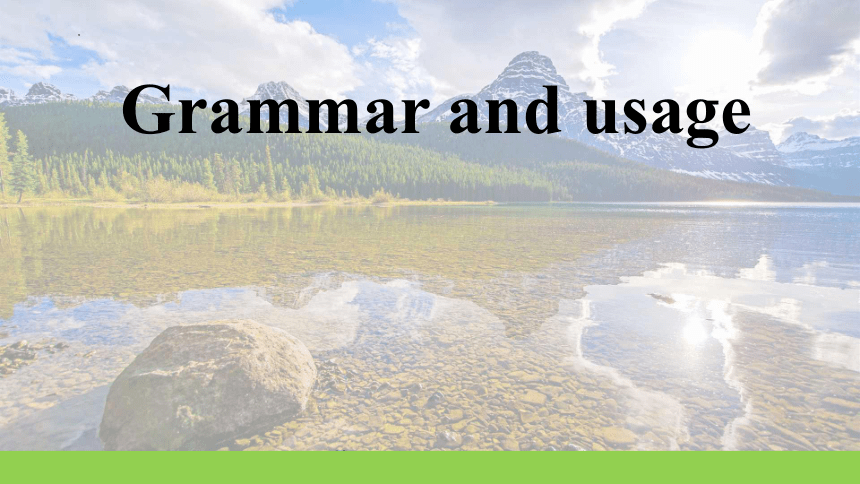
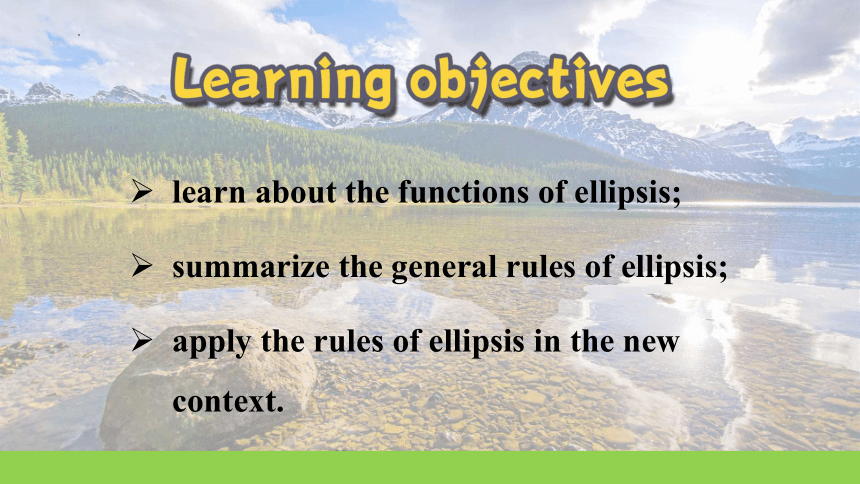

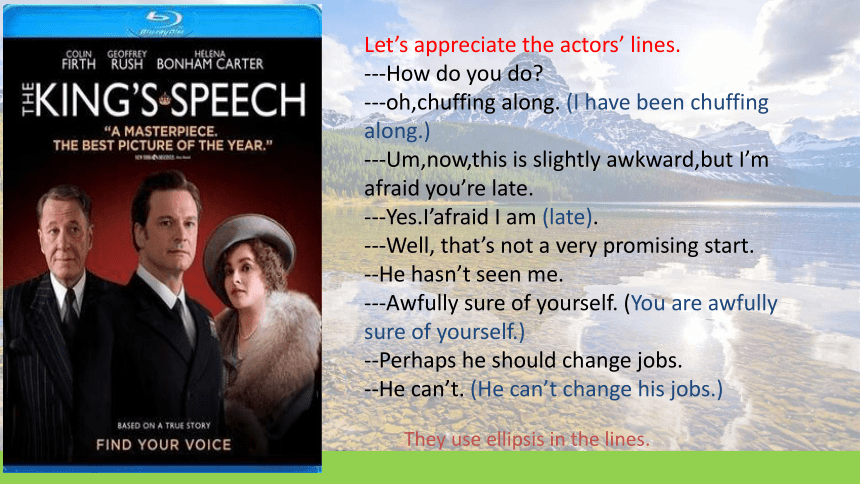
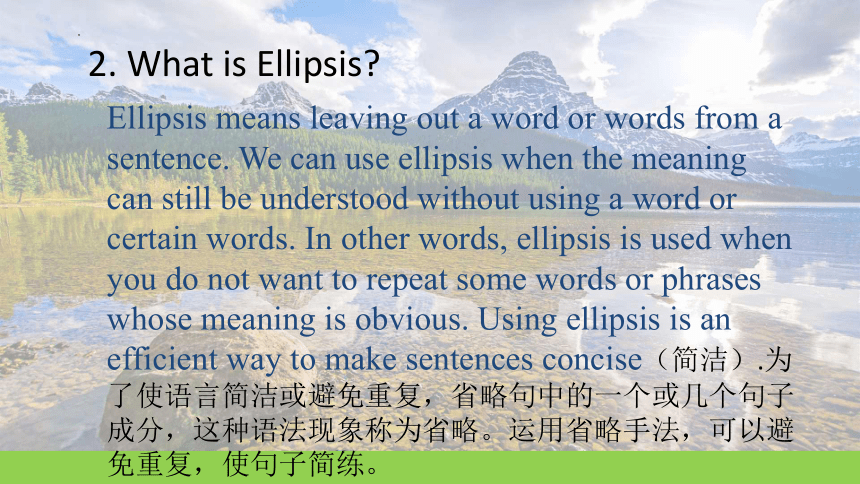

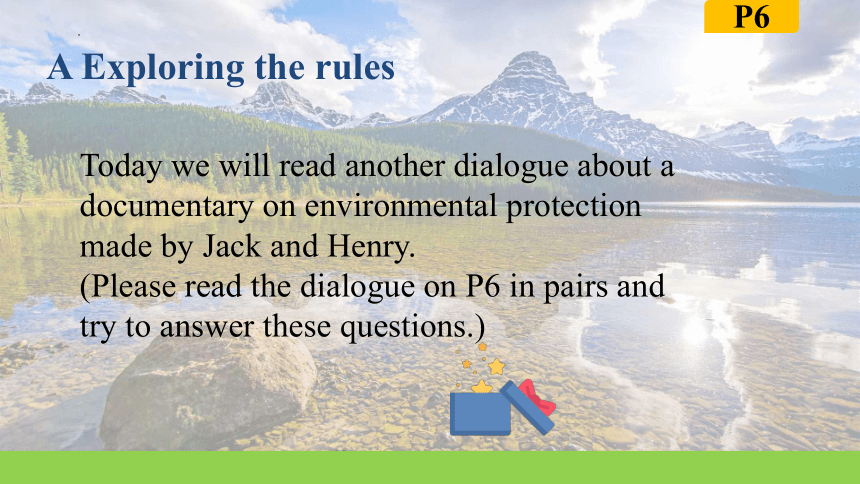
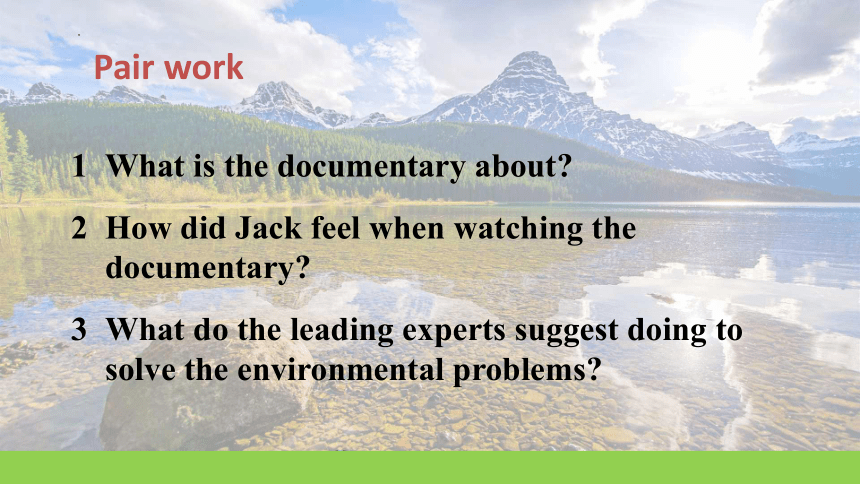
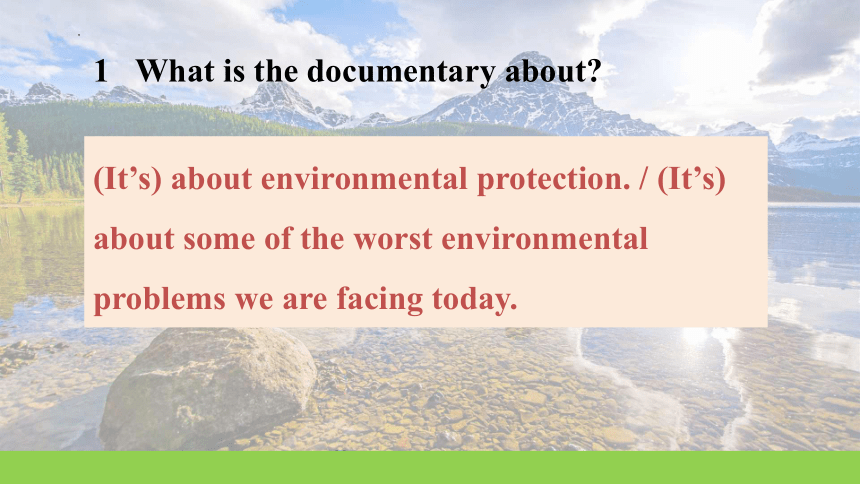
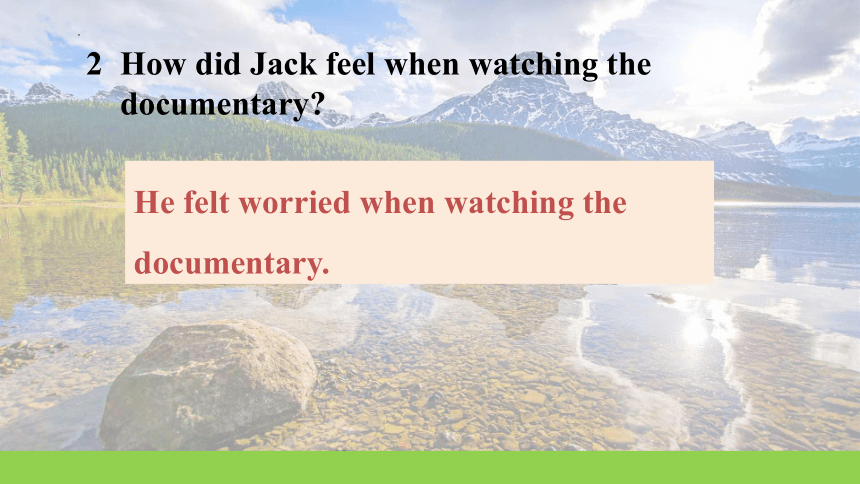

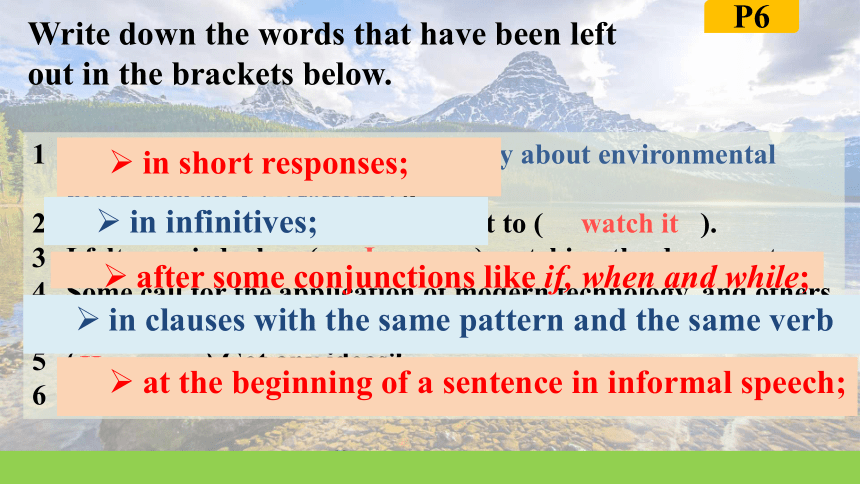
 资源预览
资源预览











